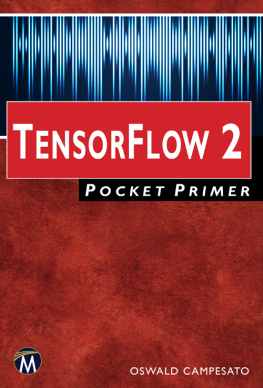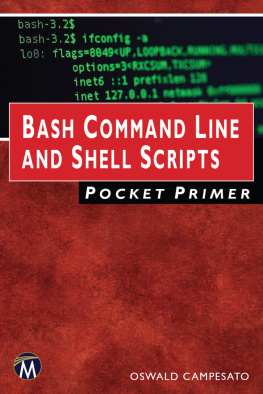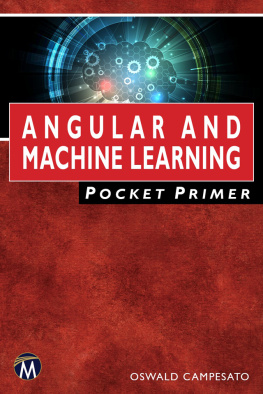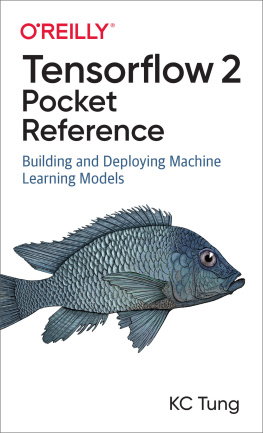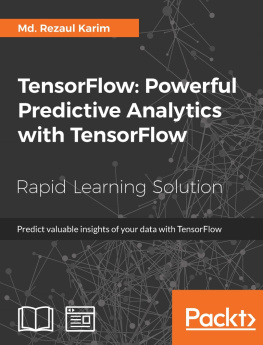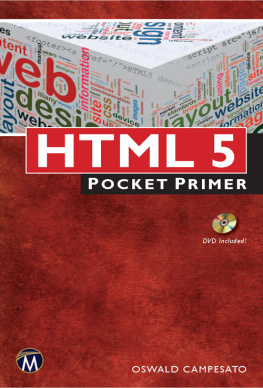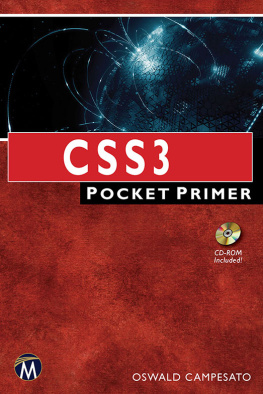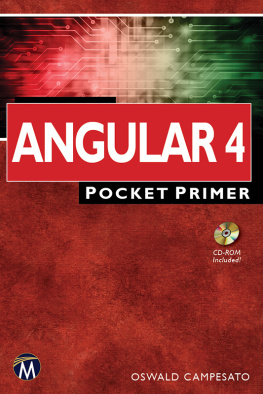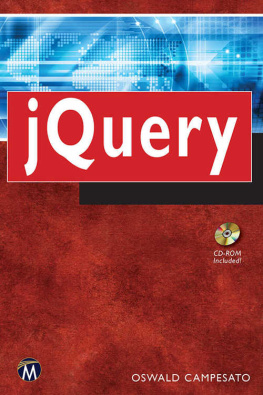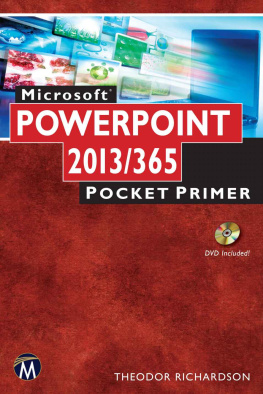Oswald Campesato - TensorFlow 2.0 Pocket Primer
Here you can read online Oswald Campesato - TensorFlow 2.0 Pocket Primer full text of the book (entire story) in english for free. Download pdf and epub, get meaning, cover and reviews about this ebook. year: 2019, publisher: David Pallai, genre: Computer. Description of the work, (preface) as well as reviews are available. Best literature library LitArk.com created for fans of good reading and offers a wide selection of genres:
Romance novel
Science fiction
Adventure
Detective
Science
History
Home and family
Prose
Art
Politics
Computer
Non-fiction
Religion
Business
Children
Humor
Choose a favorite category and find really read worthwhile books. Enjoy immersion in the world of imagination, feel the emotions of the characters or learn something new for yourself, make an fascinating discovery.
- Book:TensorFlow 2.0 Pocket Primer
- Author:
- Publisher:David Pallai
- Genre:
- Year:2019
- Rating:5 / 5
- Favourites:Add to favourites
- Your mark:
- 100
- 1
- 2
- 3
- 4
- 5
TensorFlow 2.0 Pocket Primer: summary, description and annotation
We offer to read an annotation, description, summary or preface (depends on what the author of the book "TensorFlow 2.0 Pocket Primer" wrote himself). If you haven't found the necessary information about the book — write in the comments, we will try to find it.
TensorFlow 2.0 Pocket Primer — read online for free the complete book (whole text) full work
Below is the text of the book, divided by pages. System saving the place of the last page read, allows you to conveniently read the book "TensorFlow 2.0 Pocket Primer" online for free, without having to search again every time where you left off. Put a bookmark, and you can go to the page where you finished reading at any time.
Font size:
Interval:
Bookmark:
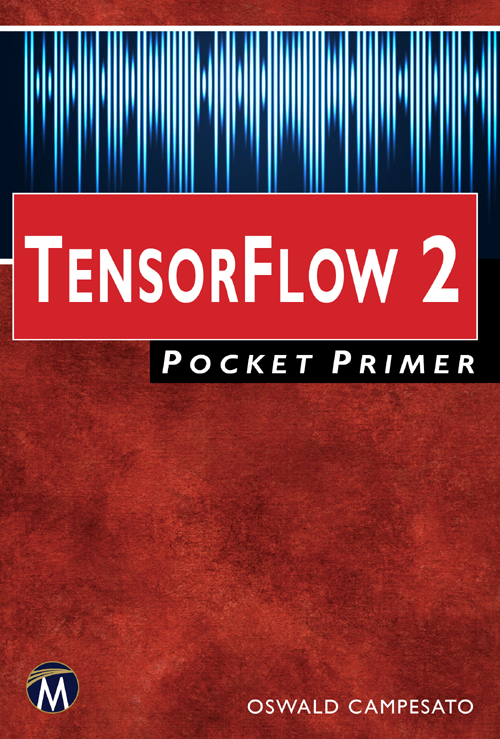
TensorFlow 2.0
Pocket Primer
LICENSE, DISCLAIMER OF LIABILITY, AND LIMITED WARRANTY
By purchasing or using this book and disc (the Work), you agree that this license grants permission to use the contents contained herein, including the disc, but does not give you the right of ownership to any of the textual content in the book / disc or ownership to any of the information or products contained in it. This license does not permit uploading of the Work onto the Internet or on a network (of any kind) without the written consent of the Publisher. Duplication or dissemination of any text, code, simulations, images, etc. contained herein is limited to and subject to licensing terms for the respective products, and permission must be obtained from the Publisher or the owner of the content, etc., in order to reproduce or network any portion of the textual material (in any media) that is contained in the Work.
Mercury Learning and Information (MLI or the Publisher) and anyone involved in the creation, writing, or production of the companion disc, accompanying algorithms, code, or computer programs (the software), and any accompanying Web site or software of the Work, cannot and do not warrant the performance or results that might be obtained by using the contents of the Work. The author, developers, and the Publisher have used their best efforts to insure the accuracy and functionality of the textual material and/or programs contained in this package; we, however, make no warranty of any kind, express or implied, regarding the performance of these contents or programs. The Work is sold as is without warranty (except for defective materials used in manufacturing the book or due to faulty workmanship).
The author, developers, and the publisher of any accompanying content, and anyone involved in the composition, production, and manufacturing of this work will not be liable for damages of any kind arising out of the use of (or the inability to use) the algorithms, source code, computer programs, or textual material contained in this publication. This includes, but is not limited to, loss of revenue or profit, or other incidental, physical, or consequential damages arising out of the use of this Work.
The sole remedy in the event of a claim of any kind is expressly limited to replacement of the book and/or disc, and only at the discretion of the Publisher. The use of implied warranty and certain exclusions vary from state to state, and might not apply to the purchaser of this product.
Companion files for this title are available by writing to the publisher at .
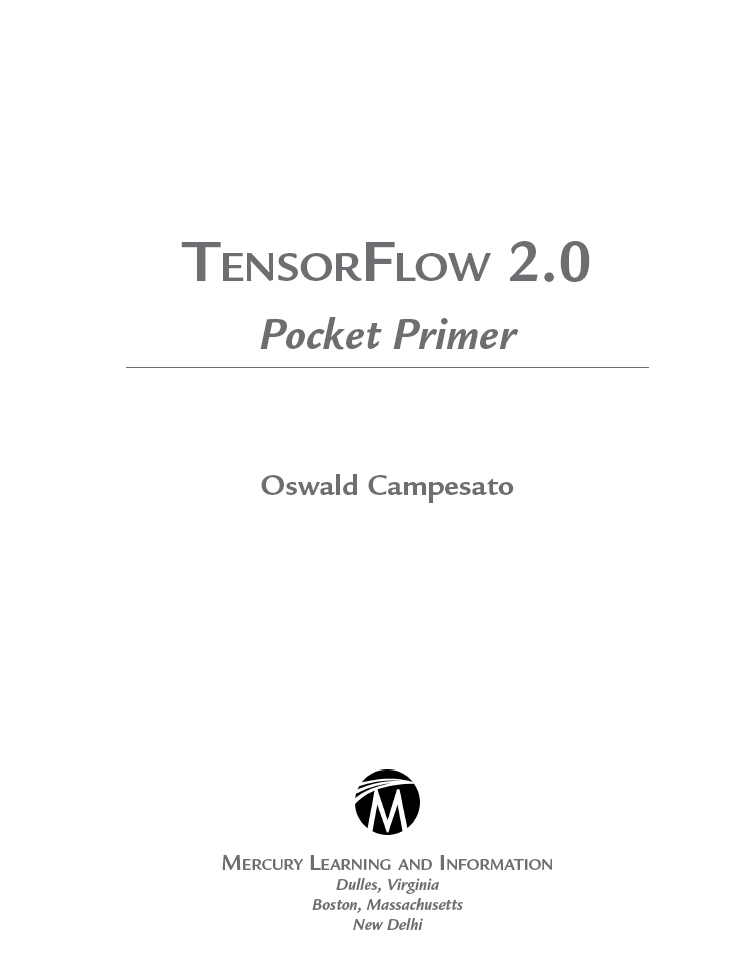
Copyright 2020 by M ercury Learning and Information LLC. All rights reserved.
This publication, portions of it, or any accompanying software may not be reproduced in any way, stored in a retrieval system of any type, or transmitted by any means, media, electronic display or mechanical display, including, but not limited to, photocopy, recording, Internet postings, or scanning, without prior permission in writing from the publisher.
Publisher: David Pallai
Mercury Learning and Information
22841 Quicksilver Drive
Dulles, VA 20166
www.merclearning.com
800-232-0223
O. Campesato. TensorFlow 2.0. Pocket Primer.
ISBN: 978-1-68392-460-9
The publisher recognizes and respects all marks used by companies, manufacturers, and developers as a means to distinguish their products. All brand names and product names mentioned in this book are trademarks or service marks of their respective companies. Any omission or misuse (of any kind) of service marks or trademarks, etc. is not an attempt to infringe on the property of others.
Library of Congress Control Number: 2019941748
192021321 This book is printed on acid-free paper in the United States of America.
Our titles are available for adoption, license, or bulk purchase by institutions, corporations, etc. For additional information, please contact the Customer Service Dept. at
800-232-0223(toll free).
All of our titles are available in digital format at academiccourseware.com and other digital vendors. Companion files (figures and code listings) for this title are available by contacting . The sole obligation of Mercury Learning And Information to the purchaser is to replace the disc, based on defective materials or faulty workmanship, but not based on the operation or functionality of the product.
Id like to dedicate this book to my parents
may this bring joy and happiness into their lives.
WHAT IS THE GOAL?
T he goal of this book is to introduce TensorFlow 2 fundamentals for basic machine learning algorithms in TensorFlow. It is intended to be a fast-paced introduction to various core features of TensorFlow, with code samples that cover deep learning and TensorFlow. The material in the chapters illustrates how to solve a variety of tasks using TensorFlow, after which you can do further reading to deepen your knowledge.
This book provides more detailed code samples than those that are found in intermediate and advanced TensorFlow books. Although it contains some basic code samples in TensorFlow, some familiarity with the software will be helpful.
The book will also save you the time required to search for code samples, which is a potentially time-consuming process. In any case, if youre not sure whether or not you can absorb the material in this book, glance through the code samples to get a feel for the level of complexity. At the risk of stating the obvious, please keep in mind the following point: you will not become an expert in TensorFlow by reading this book.
WHAT WILL I LEARN FROM THIS BOOK?
The first chapter contains TensorFlow code samples that illustrate very simple TensorFlow functionality, followed by a chapter whose code samples illustrate an assortment of built-in APIs. The third chapter delves into the TensorFlow Dataset, with a plethora of code samples that illustrate how to use lazy operators in conjunction with datasets. The fourth chapter discusses linear regression and the fifth chapter covers logistic regression. If you think that youll struggle significantly with the code in the first two chapters, then an absolute beginners type of book is recommended to prepare you for this one.
Another point: although Jupyter is popular, all the code samples in this book are Python scripts. However, you can quickly learn about the useful features of Jupyter through various online tutorials. In addition, its worth looking at Google Colaboratory, which is entirely online and is based on Jupyter notebooks, along with free GPU usage.
WHY DOES THIS BOOK INCLUDE TF 1.X MATERIAL?
If you are new to TensorFlow, then feel free to skip the TF 1.x content, particularly if you are starting with a new project involving TensorFlow and you dont have any TF 1.x. However, as this book goes to print, the vast majority of existing TensorFlow code is TF 1.x code, which is massive when you consider all the companies that are using TensorFlow. Hence, many people who are working with TF 1.x also need to learn how to convert TF 1.x to TF 2.
Almost all the TF 1.x material (including the section regarding the upgrade script from TF 1.x to TF 2) is limited to the second half of . Keep in mind another detail: even if you plan to learn only TF 2, you might be faced with a task that involves upgrading from TF 1.x to TF 2, and now youll have some potentially useful information regarding TF 1.x in this book.
Font size:
Interval:
Bookmark:
Similar books «TensorFlow 2.0 Pocket Primer»
Look at similar books to TensorFlow 2.0 Pocket Primer. We have selected literature similar in name and meaning in the hope of providing readers with more options to find new, interesting, not yet read works.
Discussion, reviews of the book TensorFlow 2.0 Pocket Primer and just readers' own opinions. Leave your comments, write what you think about the work, its meaning or the main characters. Specify what exactly you liked and what you didn't like, and why you think so.

